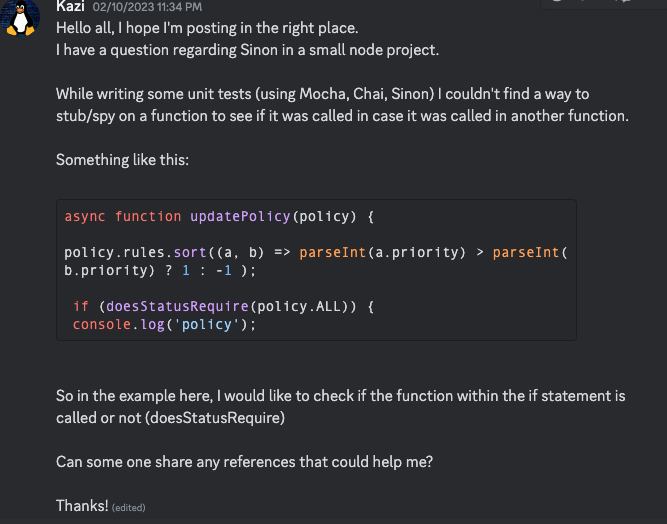I'll start with a full disclosure - Up until now, I have only written unit tests using Jest. However, at my current job, I had the opportunity to work on a small project that allowed me to choose a new testing library.
After some research, I decided to go with Mocha as a test runner and Chai for assertions. Then I reached the fun part - Mocking and Spying. The most obvious choice was Sinon, which works great as a spy (for example, if you want to know whether a certain log was printed). However, when it came to Mocking (or Stubbing), it wasn't easy at all.
If you're interested - I found this article back then and I found it to be quite true (why is it so hard to test in NodeJS)
After struggling with Sinon, I turned to the Discord Node.js community with a specific question:

The first response was a link to the rewire repository. I must say, once I started using it, I couldn't stop. It made mocking incredibly easy.
To install it simply run:
npm install rewire
import it:
const rewire = require('rewire')
To initialize it, you need to "rewire" the module that contains the functions, methods, or variables you'd like to mock.
const mockedIndex = rewire('../../index')
So let's look at some examples:
I'll start with the original question I raised in the Node Discord server. Here's my original function (just for the sake of the example):
async function updatePolicy(project, policy, file) {
return Promise.allSettled(Object.entries(file).map(([status]) => {
try {
if (!countryRules[country]) {
return Promise.resolve();
}
if (statusDisable(status))
console.log('disable');
else if (statusEnable(status))
console.log('enable');
[...]
}
I wanted a simple test case to check that the correct function is called given the right arguments. Since I had many test cases like these, I created a more "generic" function that receives the function I'd like to test as an argument.
// rewire the module
const lib = rewire('../../index')
// generic function
const checkFunctionCall = (functionName, done, file) => {
lib.__set__(`${functionName}IsCalled`, false) // setting the function under test to isCalled false
lib.__set__(functionName, () => {
// function under test is called
lib.__set__(`${functionName}IsCalled`, true) // changing the isCalled to true in this case.
})
lib.updatePolicy(project, policy, file) // Calling the function that eventually calls the function i'd like to assert on
assert.equal(lib.__get__(`${functionName}IsCalled`), true) // asserting that isCalled is true
done()
}
// test case
it('statusEnable function called', done => {
let file = 'example argument'
checkFunctionCall('statusEnable', done, file)
})
Doesn't seem so complicated, right? Moving on to mocking of an async function that should return resolved promise. Let's say this is the original function:
async function persistCatalogs(bucketName, catalogs) {
const catalogBucket = storageClient.bucket(bucketName)
return new Promise(async (resolve, reject) => {
for (const chunk of keyChunks) {
await Promise.all(
chunk.map(async catalog =>
uploadCatalog(catalogBucket, cacheTtl, catalog, catalogs[catalog])
)
)
}
resolve()
}).then(() => logger.info('Catalog uploaded!'))
}
I'd like to test that given a specific argument, the uploadCatalog function was called 12 times.
// stubbed function that will be called when mocking the uploadCatalog function
function uploadCatalogStub() {
return Promise.resolve('Mocked result')
}
//test case
it('should upload each catalog in chunks', async () => {
lib.__set__('uploadCatalog', uploadCatalogStub) // rewire will set uploadCatalogStub once uploadCatalog is called
await lib.persistCatalogs(bucketName, catalogs) // Original function called
expect(uploadCatalogStub.callCount).to.equal(12) // assertion
})
Moving on the mocking a global variable that eventually will be used in a function.
This is the function i'd like to test:
function addEventToCatalog(rawEvent, catalog) {
rawEvent.countryAvailability.forEach(c => {
if (COUNTRIES_LIST.includes(c))
catalog[c].push(event);
else
logger.warn(`Unsupported country ${c} on event ${event.assetId}, skipping for catalog`);
});
Now COUNTRIES_LIST variable is a global variable, which it's data in it might effect the result of the test. So let's mock it:
lib.__set__('COUNTRIES_LIST', structuredClone(countryCodesData)) //COUNTRIES_LIST is a global variable, here it'll return a clone of another data i chose.
and call the tested function is test as usual:
it('should add event to US catalog if countryAvailability includes US', () => {
lib.addEventToCatalog(rawEvent, catalog)
expect(catalog.US).to.have.lengthOf(1) // assertion
})
In conclusion, rewire proved to be the simplest mocking library I've had the opportunity to use in Node.js projects.
Ultimately, pairing it with a dynamic test runner like Mocha made for an easy choice compared to other libraries.
As a result, I ended up replacing all other mocks, such as Sinon Stubbing, with Rewire and haven't looked back since.



